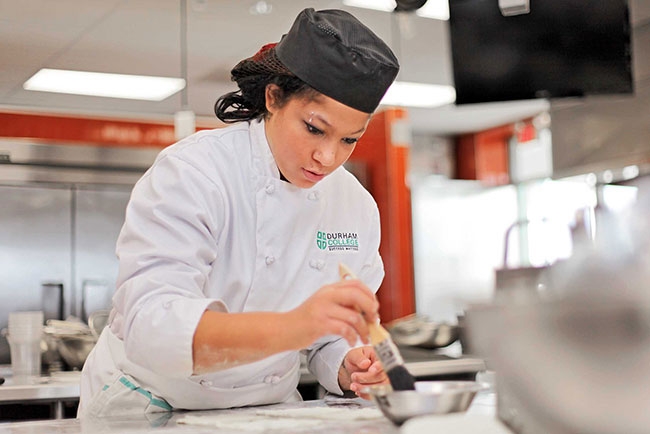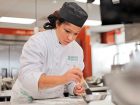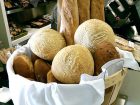
Baking School Means Business
March 30, 2017
By
Brian Hartz
Inside Durham College’s innovative baking and pastry arts program
 Durham College aspires to produce business-savvy, multi-talented bakers and pastry chefs who are ready for immediate success.
Durham College aspires to produce business-savvy, multi-talented bakers and pastry chefs who are ready for immediate success. You can be the most talented baker or pastry chef the world has ever known, but if you don’t have the business sense and skills to back up your abilities in the kitchen, and you aren’t a lifelong learner keen to keep up with rapidly changing trends and tastes, you might never know success.
That’s the philosophy at the heart of Durham College’s advanced baking and pastry arts program, located at the W. Galen Weston Centre for Food on the school’s Whitby, Ont., campus.
“The majority of our students are entrepreneurial,” says program co-ordinator Tanya Heck, an experienced pastry chef who also serves as a professor. In addition, Heck, who owned and operated her own bakery in Calgary for five years, helped found the program. She says the emphasis on entrepreneurship skills is “by design, absolutely. So many of our students are interested in opening something. Also, the program isn’t necessarily focused solely on opening a bakery business. Many students are coming from a culinary background.”
That’s another differentiator for Durham’s approach to educating Canada’s future bakers and pastry chefs. Students who enroll in the program are required to have met one of three prerequisites: a diploma in culinary management from an Ontario college or a related culinary diploma; successful completion of a levels 1 and 2 of a cook apprenticeship program; or be certified as a Red Seal cook or Red Seal chef.
“We are asking students to have a culinary history so we don’t have to teach the very basic skills,” Heck says. “That’s so they can move quite quickly into the really advanced skills.”
Those advanced skills, Heck explained, include a grounding in the “field-to-fork” concept that’s revolutionizing how consumers view the food industry and informing so many more purchasing decisions than in the past.
“All of a sudden, the consumer is very educated,” Heck says. “When I was starting out, customers didn’t know that much and they didn’t seem to care that much, either. Today, both restaurants and customers are paying close attention to where food is coming from. At Durham, we have relationships with local farms and are getting food there instead of stuff that’s been on a plane or a boat for a week.”
Durham also requires prerequisites, Heck says, as a response to industry demand for more well-rounded culinary professionals. “Many businesses aren’t hiring strictly pastry chefs anymore,” she explains. “They don’t have that kind of budget. So, our program is about expanding skills that students already have. They usually get some baking education at other programs, but maybe not enough. We are looking at building on those skills.”
Marco Cassano, owner of Annina’s Bakeshop, Café & Catering in Goodwood, Ont., helped design the program and says its emphasis on personal brand development is another factor that helps it stand apart from others. “Chef Tanya is really good at teaching the students about getting their name out there and getting their names on everything that they do,” he says. “Durham teaches the traditional way but also modern business techniques like branding and initializing things. We give encouragement to the students to keep pushing forward. And even after the program, we are there for them. They can always contact us with questions.”
Cassano isn’t teaching at Durham presently but plans to go back to an instructional role at some point in the future. He says he taught just about every subject possible, ranging from food theory to advanced labs and large-client retail strategy. But he also learned a lot in the process that has helped him in his career as a small business owner/operator.
“I learned patience,” he says. “Working with students, you have to learn patience. You also learn to look at things in other ways. You break recipes down into their components; you look beyond the recipe and why it’s being put together that way.”
Both Cassano and Heck cited the program’s advanced bakery capstone course as another way that Durham strives to go above and beyond the call of duty when it comes to educating students about the practical matters of owning and operating a bakery. According to the program description, the course requires students to “design, plan and execute a final capstone project, which includes menu planning, costing, ordering, marketing, producing, decorating and packaging a variety of items to be sold at a special event.” Heck says students set up a “pop-up” bakeshop in the foyer of the building that houses the advanced baking and culinary arts program.
Cassano says the capstone project teaches students how to build a business – “not just on paper … they have to bring it to life for one entire day.” Adds Heck, “Everything they’ve learned during the year they have to execute. Short of writing a business plan, it’s pretty much everything you’d be doing while operating a business.”
The Student
One of the students set to do a capstone project is Kristin Atwood, a graduate of Durham’s culinary management program who’ll complete her certificate in advanced baking and pastry arts in April. She’s currently employed at Braden Hall in Toronto where she handles catering services, with some cooking and pastry-prep duties sprinkled in, as well. Atwood, 26, is the inaugural winner of Durham’s Gold Medal Award, which was created to recognize outstanding achievements by students in the college’s culinary management program. Criteria include attendance, volunteerism, professionalism, attitude and academic standing throughout students’ time at DC.
The award includes an all-expenses-paid trip to Calabria, Italy, to study at Italian Culinary Institute for a week. Atwood travelled to Italy in June 2016. For Atwood, who says she’s drawn to food science and product development, it was an invaluable experience.
“I learned a lot about Italian regional cuisine,” she says. “It was only for a week but it seemed longer because we put in super-long days. I’ve also worked in Paris and I see myself working abroad again. It’s very beneficial to get those experiences first-hand. It’s essential to get to see how people in other cultures cook.”
However, she added in a news release, “It was while working in Paris that I realized without formal culinary training, certain doors in the industry would always remain closed to me. So I returned to school for a second time, choosing Durham College because of its excellent reputation in culinary arts. I knew after graduating from Durham, those doors would begin to open.”
The Graduate
Doors are opening for recent Durham graduate Glenda Neatt, a Torontonian by birth who moved to the Durham region after getting married and landed a job at an animal shelter. Neatt, however, says she’d always had a passion for cooking and baking and began to mull a new direction for her career after corporate restructuring resulted in her losing her job.
“When the opportunity came up to go back to school, that’s what I decided to do,” she says. Neatt says she chose Durham over other schools because of its small size and “field-to-fork” approach to the food business. “It’s helped me with the business aspect of things,” she adds. “We learn about financing and all the other steps we need to take to open a business.”
Like Atwood, Neatt enrolled in the two-year culinary management curriculum before moving on to the advanced baking and pastry arts program. Now that she’s matriculated, Neatt is employed as first cook at Bistro ’67, a teaching-inspired restaurant located on Durham’s Whitby campus. She’s working on a business plan and hopes to open her own bakery business within a year. In the meantime, she’s getting valuable work experience and has easy access to the sage advice of her former instructors at Durham. It’s an ideal situation, she says.
“I’m still in the beginning stages of my business plan, but I’ve been looking at locations that would be best suited for me,” Neatt says. “In the beginning I would be solo and work out of home and do deliveries, but then eventually I’ll open up my own shop.”
Neatt says her favourite items to make are cakes and cupcakes, doughnuts, and French pastries, and she won a cake-decorating contest during her days as a student at Durham. However, she’s been a vegetarian for about 20 years, so the chances are good that she will be able to cater to customers who share that lifestyle. “When I look at a recipe, I look at a way to make it vegan or vegetarian,” she says.
Like Neatt, Atwood is already dipping a toe into the food business. She’s providing recipe and product development services, in addition to engaging in food media production, including photography and content creation for companies’ social media feeds. She has also launched thebuttery.co, an online culinary and travel magazine that shares tips, tricks, recipes and photos.
“I think most students’ goal is to run their own business whether it’s opening their own bakery or restaurant,” Atwood says. “Most fail within a year or two because they aren’t taught the business side of things, like basic accounting and management skills. Durham really gives you a leg up when you are going out there to start your own business.”
For more information about enrolling in Durham’s advanced baking and pastry arts program, visit http://bit.ly/2kL2kNr.
Print this page


Leave a Reply